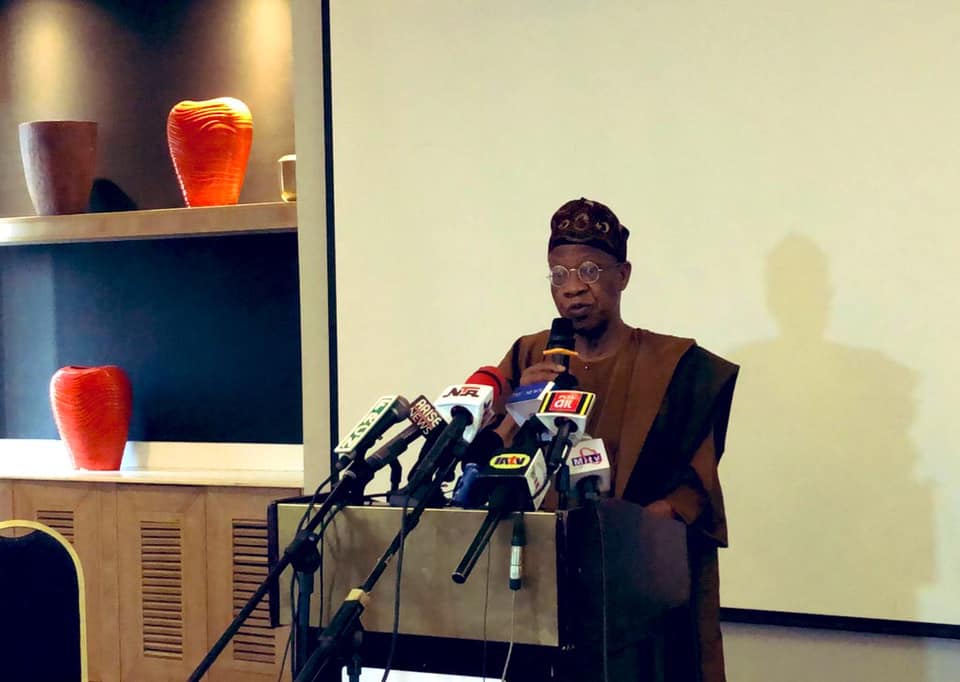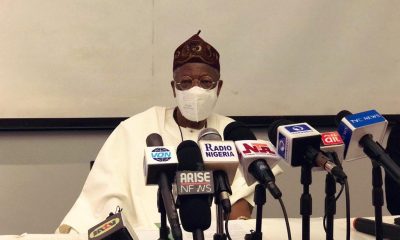General
Minister Tasks Editors On Change Agenda

The Minister of Information and Culture, Alhaji Lai Mohammed, has commended the Nigerian Guild of Editors (NGE) for being part of the on-going determined efforts to tackle the various challenges facing the country, especially in the area of the economy.
Speaking at the All Nigerian Editors Conference (ANEC) 2016 in Port Harcourt on Thursday, the Minister however urged the Editors to do more by becoming the Champions of Change.
”Permit me to start my remarks by commending the Nigerian Guild of Editors for the well-thought-out theme for this 2016 Conference, which is ”Economic Diversification: Agriculture as an option for a prosperous Nigeria”. As you are all very much aware, Agriculture is one of the sectors we have identified in our economic diversification programme, aimed at moving the country away from a mono-product, oil-based economy, under our Change Mantra.
”It is therefore delightful that you have chosen to deepen the discourse by the choice of your theme for this conference. Even more impressive is the fact that Editors have taken up the challenge of contributing their quota to the ongoing efforts by this Administration to revamp the economy and return Nigeria to the path of sustainable growth and development,” he said.
Alhaji Mohammed however said the NGE in particular and the media in general must do more by becoming the Champions of Change
”What I am saying in essence is that while the media owes it as a duty to keep Nigerians well informed about the situation in the country, it must do so in context. We are not saying we should continue to lament about missed opportunities, the massive corruption or profligacy of the past, but is it is important for Nigerians to know where and when the rain started beating them, that no provision was made for any umbrella to shield them from the elements, and that indeed genuine efforts are now being made to turn things around.
”One of such efforts is the unprecedented massive investment in infrastructure – roads, railways, power, etc. Road Contractors have been mobilised to sites, many of them long abandoned. Any contractor who is not on site is waiting for the rains to stop, not due to lack of funds. The Administration has kick-started the programme to link all state capitals by rail. All these efforts are creating jobs and putting money in the pockets of Nigerians.
”We must give hope to our people, while also giving encouragement to those who are working non-stop to revamp our economy. In one country that failed to save for the rainy day like Nigeria did, citizens now have to cross to neighbouring countries to get essential commodities. The only reason we have averted such fate here is the committed, honest and disciplined leadership provided by President Muhammadu Buhari, the prudent management of the little resources that are accruing to the country now, thanks to the Treasury Singles Account, the unrelenting war against corruption, the rooting out of ghost workers and the increasing emphasis on agriculture that is sure to massively reduce our scandalously-high food imports in a short while,” he said.
The Minister said Nigeria’s economy is hard hit by the fall in the price of crude oil because the country failed to save for the rainy day, coupled with the fact that the country did not invest in infrastructure
”Nigeria has nothing to rely on to cushion the effects of the lost earnings. Many other oil producing countries and fellow OPEC members are faring better, because they saved for the rainy day. Saudi Arabia, with about one fifth of Nigeria’s population, has in foreign reserves about 600 billion dollars (which is 23 times what Nigeria has in foreign reserves). United Arab Emirates, with less than 10 million people, has 75 billion dollars in foreign reserves. Qatar, with 2.4 million people, has 36 billion dollars in foreign reserves. Even Angola, with just 24 million people, has about 25 billion dollars in foreign reserves.”
”Here in Nigeria, with oil selling consistently for over 100 dollars a barrel for many years, we simply failed to save for the rainy day, with the result that a country with a population of over 170 million today has just 26 billion dollars in foreign reserves. To compound this, the fall in the price of crude is having a ripple effect: the scarcity of forex, which has resulted from the oil price crash, means that industries are struggling to get forex to import raw materials and machinery. With falling imports, the Customs Service, which is another source of revenue, is collecting fewer duties. Taxation is also affected, as industries with no forex to import can neither employ more people nor produce more goods. Then, Nigeria has had to fight an existential battle to root out Boko Haram in the North-east,” he said.
General
NCC Arraigns Netnaija’s Emma Analike Over Alleged Copyright Infringement

By Modupe Gbadeyanka
The chief executive of Netnaija Media Enterprises, Mr Emmanuel Analike, has been arraigned before a Federal High Court sitting in Abuja by the Nigerian Copyright Commission (NCC).
The suspect appeared before Justice Suleiman Liman on Wednesday over allegations bordering on copyright infringement.
He was accused by the NCC of using his online platform to make movies and others not belonging to him available for users to download on the internet.
According to the agency, Mr Analike has infringed copies of audio-visual materials distributed online via his website for online users. Netnaija is an online movie and music download site.
The prosecution counsel, Ms Gladys Isaac-Ojo, who works with the NCC, told the court that the defendant committed an offence contrary to and punishable under Section 44 (1) (a) of the Copyright Act, 2022.
However, Mr Analike pleaded not guilty to the charges preferred against him, prompting his counsel, Nnemeka Ejiofor, seek his bail.
The lawyer informed the court that the application was filed on Monday and supported by 23 paragraphs of affidavits and a written address.
But the judge refused to give a bench ruling and adjourned the ruling of the bail application to Monday, March 9, 2026, ordering the remand of the Netnaija chief in Kuje Correctional Centre.
General
Entries Open for ClimateLaunchpad Green Business Ideas Competition

By Modupe Gbadeyanka
Entries for the 2026 edition of the world’s largest green business ideas competition, ClimateLaunchpad, have opened.
In 2025, the programme, organised by Climate KIC, received over 2,700 applications from 40 countries. The winning ventures gain prize money, investor connections, and access to a global cleantech network.
This year’s edition is expected to be bigger and better, with climate innovators, green venture builders, and entrepreneurs from around the world given the opportunity to apply.
Since its inception in 2014, the programme has supported nearly 5,000 ideas across 97 countries, and this year, it is expanding its presence in Asia with Singapore hosting both the regional final and global grand final for the first time.
Participants move through several stages, including an initial mini-course to refine the concept, an intensive multi-day Boot Camp led by expert trainers, targeted coaching to perfect value propositions and investor pitches, national and regional finals, and a place at the global grand final, with prizes and access to a global climate network.
“Strengthening ClimateLaunchpad’s presence in Asia marks a profound new chapter for this programme and for the climate innovation movement more broadly. Asia is where so much of the world’s climate and nature future will be shaped, through business leadership, public-private partnerships and long-term strategic thinking,” the chief executive of Climate KIC, Kirsten Dunlop, stated.
“We look forward to supporting this momentum with new business ideas and innovation ecosystem collaborations across more than a dozen countries.
“This expansion opens space for deeper cross-cultural connections and for first-time founders to turn sparks of imagination into solutions that serve both people and planet,” Dunlop added.
Also commenting, the chief executive of Better Earth Ventures, Ms Rebecca Sharpe, said, “We are proud to host ClimateLaunchpad’s regional and global grand final in Singapore and to convene an international group of climate entrepreneurs from more than 50 countries.
“Climate solutions are emerging from every corner of the world, and bringing them together creates the kind of cross-border exchange and collaboration this moment demands. Our focus is to ensure early-stage founders have the structure, ecosystem access and support needed to move from idea to credible impact.”
General
Nigeria Okays Alphanumeric Digital Postcode System to Boost Delivery

By Adedapo Adesanya
Nigeria has finally approved the use of an alphanumeric digital postcode system for the country, 17 years after it was first considered.
According to the Minister of Communications and Digital Economy, Mr Bosun Tijani, the system was okayed at the Federal Executive Council (FEC) meeting on Wednesday, chaired by President Bola Tinubu, in line with the ministry’s strategic blueprint.
He said working in collaboration with the Nigerian Postal Service (NIPOST), the ministry will introduce a modern, geospatially intelligent addressing system that improves accuracy across the country and enables faster and more reliable mail and parcel processing.
“Beyond strengthening postal operations, the Digital Postcode System will also serve as an important national enabler supporting better national planning, improved emergency response, more efficient logistics and e-commerce, and the delivery of government services.
“As our digital economy continues to grow, foundational systems such as this play an essential role in building the infrastructure required to connect people, businesses, and services more efficiently across the country,” he said.
He noted that the approval represents another step forward in the Mr Tinubu-led administration’s commitment to building the enabling environment to support a modern, inclusive, and globally competitive digital economy.
On her part, Ms Tola Odeyemi, the Post Master General and chief executive officer of NIPOST, said the implementation is a foundational step toward building the digital infrastructure required for a modern economy.
“First conceptualised in 2009, this initiative is finally becoming a reality in 2026 under the leadership of President Bola Tinubu and the Minister of Communications, Innovation and Digital Economy, Dr Bosun Tijani,” she wrote on X, formerly Twitter.
“A digital postcode system is more than a postal reform. It is critical national infrastructure that enables e-commerce, logistics, emergency services, financial inclusion, security, urban planning, and effective public service delivery,” she added.
By introducing an alphanumeric addressing framework, Nigeria will now be able to identify locations with far greater precision across cities, towns, and rural communities.
“This will significantly improve how goods, services, and digital platforms reach Nigerians everywhere.
“This milestone reflects a shared commitment by the Federal Government to strengthen Nigeria’s digital backbone and unlock new opportunities for innovation, commerce, and national development,” she further stated.
-

 Feature/OPED6 years ago
Feature/OPED6 years agoDavos was Different this year
-
Travel/Tourism10 years ago
Lagos Seals Western Lodge Hotel In Ikorodu
-

 Showbiz3 years ago
Showbiz3 years agoEstranged Lover Releases Videos of Empress Njamah Bathing
-

 Banking8 years ago
Banking8 years agoSort Codes of GTBank Branches in Nigeria
-

 Economy3 years ago
Economy3 years agoSubsidy Removal: CNG at N130 Per Litre Cheaper Than Petrol—IPMAN
-

 Banking3 years ago
Banking3 years agoSort Codes of UBA Branches in Nigeria
-

 Banking3 years ago
Banking3 years agoFirst Bank Announces Planned Downtime
-

 Sports3 years ago
Sports3 years agoHighest Paid Nigerian Footballer – How Much Do Nigerian Footballers Earn





















